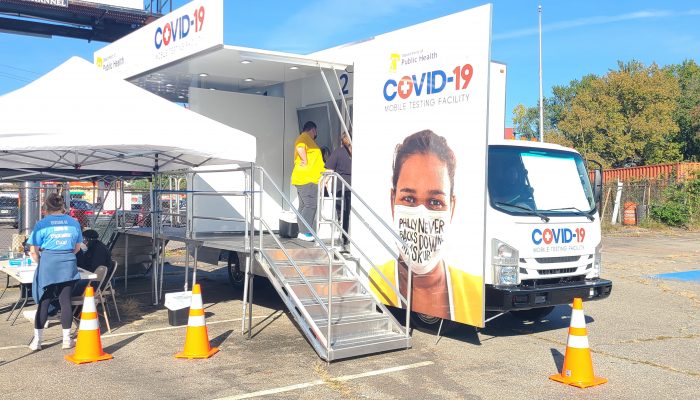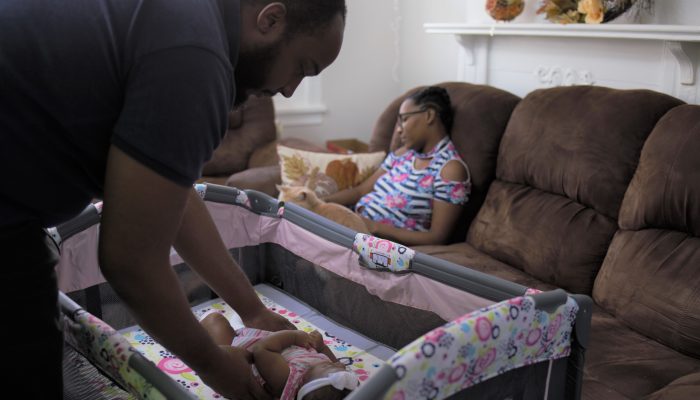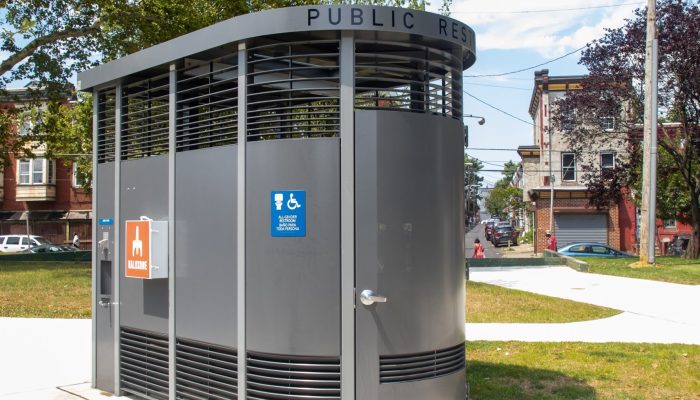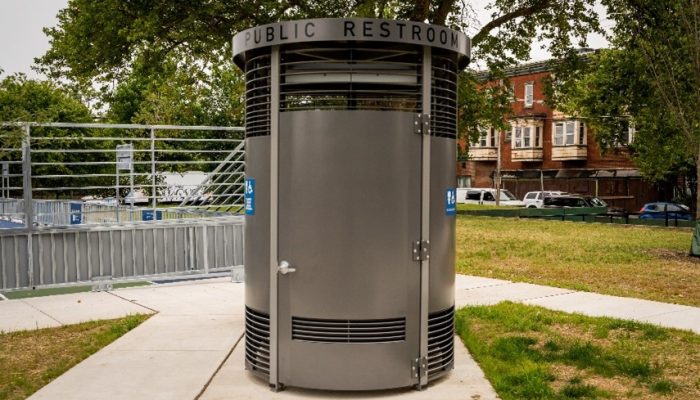The COVID-19 pandemic led to many industries and businesses scaling back what they do. Sadly, some weren’t able to weather the times, and we miss them. Things are different at health departments, though. A pandemic is one of their busiest times. Most Philadelphians have seen the testing clinics and vaccine clinics that the Health Department has held over the last two years. But that’s just a small taste of some of the things we’ve been up to.
Ambulatory Health Services, the City’s Health Centers
The Health Department’s nine Health Centers never closed during the COVID-19 pandemic. The Health Centers rapidly integrated tele-health visits, so patients still had access to their health care team. The overall day-to-day management of patients flows meant changing the how the Health Centers worked from “walk-in” to an “urgent care” model to improve social distancing in the Health Centers. Safety plexiglass barriers were installed throughout each of the Centers.
The Health Centers were also a key part of the City’s response to the pandemic. Health Center staff not only performed more than 22,500 COVID tests, they gave 76,380 doses of COVID vaccine to 36,419 patients. Four new annexes were opened to facilitate new COVID responsibilities. Staff from the Health Centers helped staff the department’s new COVID Call Center and the drive-thru testing clinic at Citizen’s Bank Park.
AIDS Activities Coordinating Office
AACO has been working to implement the City’s first-ever Ending the HIV Epidemic Community Plan.
During the pandemic, AACO awarded contracts to six sites for engagement and re-engagement activities for treating people living with HIV; awarded four sites to provide new services under a “low threshold model for sexual health services,” increasing access to priority populations and underserved parts of Philadelphia. They increased funding for six organizations to provide focused status-neutral community-based testing in priority populations and established the first-ever nonoccupational post-exposure prophylaxis (nPEP) center of excellence.
Chronic Disease and Injury Prevention
Many staff assisted with the COVID response, staffing phone lines, helping at food distribution sites, helping with community outreach events, and creating the project with Mural Arts that paid local artists to design art with COVID safety messages that appeared all over our city.
Environmental Health Services
The Environmental Health Services division immediately expanded their inspection and enforcement duties to include all COVID related complaints, with the exception of construction sites, in addition to their regular inspection duties. These new inspections required training on issues of masking, social distancing, ventilation, and vaccine proof. Inspectors had to inspect businesses, like gyms, that they never had before. In order to help businesses comply with the rapidly changing guidance from the Health Department, Environmental Health began publishing training videos on the Health Department’s YouTube channel.
Office of Facilities Management
The Office of Facilities Management never stopped working throughout the pandemic. They were instrumental in installing and upgrading Health Department facilities to ensure that staff could keep working safely. This includes building out four new Health Center Annexes to support vaccine and testing clinics, installing plexiglass dividers throughout Health Centers, and providing additional disinfection services at all Health Department facilities.
Laboratory Services
While most people have come into contact with reference or academic labs during the pandemic as they’ve gotten tested for COVID. The Health Department’s Laboratory Services division was able to build capacity to do the same type of testing for patients at our Health Centers, investigations in the Medical Examiner’s Office, the Philadelphia Department of Prisons, and in our COVID testing events and clinics. In many cases, they did this work more quickly than the famous reference labs. The Lab also provided training, kits, and oversight to the School District of Philadelphia, the Prisons and community partners like Puentas de Salud.
Maternal, Child, and Family Health
The division of Maternal, Child, and Family helped launched several new programs to help families and new moms be healthy and safe. MCFH launched Pacify, a free 24/7 on-demand telelactation app which has had over 3,000 users. They also launched a Doula Support System which offers educational, and informational support throughout pregnancy, childbirth, and up to one year postpartum for families affected by substance use disorder. The doulas in this program have attended 32 births, virtually or in-person, and have conducted more than 270 prenatal and 405 postpartum visits. In 2021, MCFH launched Philly Families CAN, the city’s home visiting centralized intake system and has received referrals for over 800 families.
Medical Examiner’s Office
The Medical Examiner’s Office maintained full operations throughout the COVID-19 pandemic, which was one of the busiest times in the history of the Office, including during the unprecedented spike in deaths due to the Omicron variant. They conducted investigations and postmortem examinations of suspected COVID-19-related deaths throughout the pandemic, and just recently relocated operations to a new state-of-the-art facility.
Substance Use Prevention and Harm Reduction
In 2020, Philadelphia suffered the worst year in overdose deaths in the city’s history. The SUPHR team was busy. In response to the pandemic, they supported vaccination efforts among substance users in Kensington. In response to the great and growing number of overdoses, SUPHR installed the first free naloxone tower in West Philadelphia, launched a media campaign about naloxone, distributed more than 54,000 doses of life-saving naloxone, trained more than 1,700 people in overdose prevention and distributed more than 100,000 fentanyl test strips. As part of a team working to keep Kensington clean, they picked-up over 132,000 and more than 7,300 bags of trash. As part of an ongoing program, they provided bereavement care services to more than 1,250 people who lost someone due to overdose.
All of this work is in addition to all of the work that the Health Department normally does.




